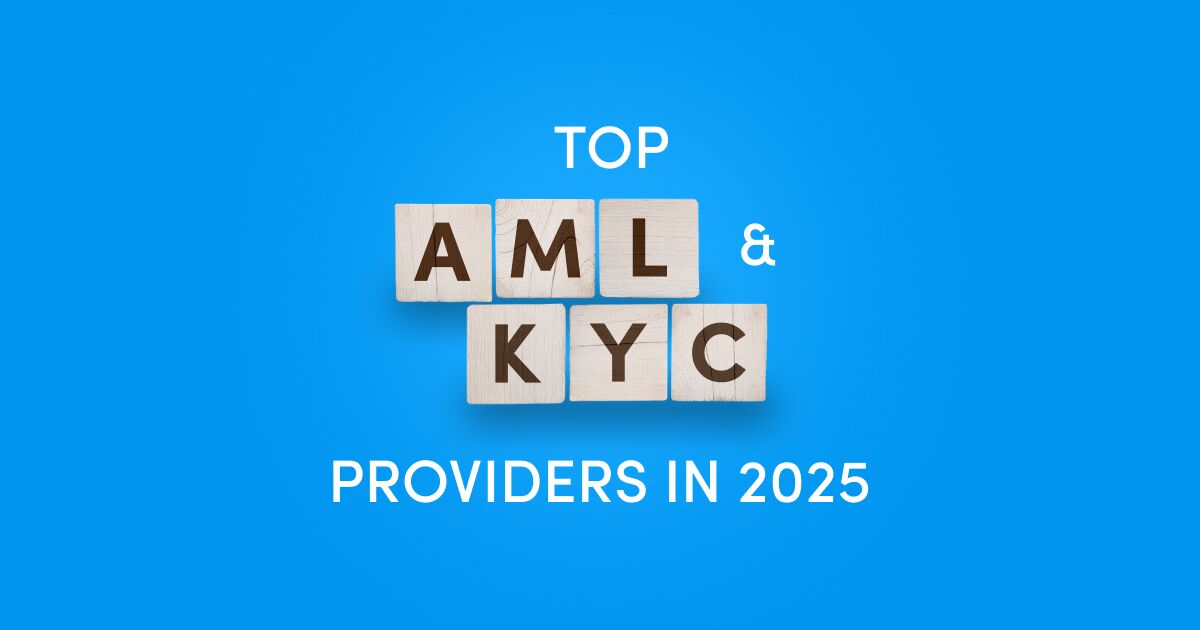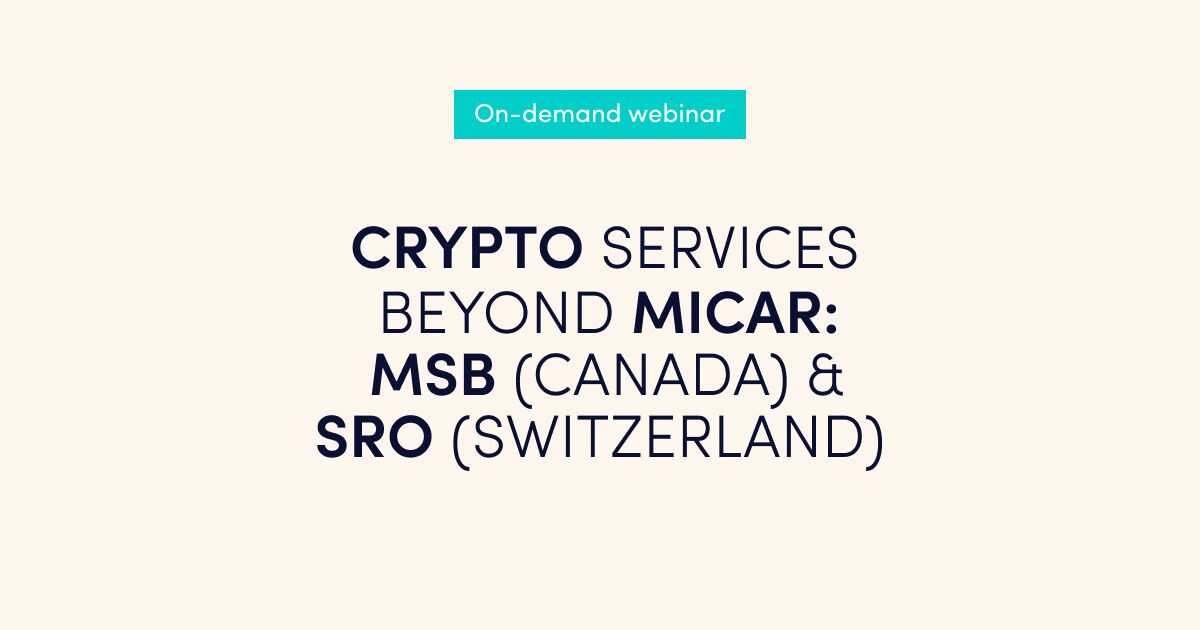Switzerland’s location at the heart of central Europe, its long-standing neutrality, and a reputation for stability and efficiency have made it a global banking powerhouse.
But the country’s business-friendly approach to innovation, and a robust, yet flexible and forward-looking regulatory framework mean banking isn’t its only strength. Switzerland is also well-worth considering if you’re thinking of launching a fintech or crypto business.
Here’s a rundown of the Swiss fintech regulatory landscape, and a look at what to consider if you’re thinking of setting up as a fintech in Switzerland:
- The ins and outs of Swiss fintech regulation, particularly SRO membership
- Which types of businesses Swiss SRO membership is best-suited for
- What the process of obtaining SRO authorisation entails
The lay of the land: How does Switzerland regulate fintechs?
Switzerland has a two-tier regulatory system.
FINMA, the Swiss Financial Market Supervisory Authority, regulates the Swiss financial services industry, issues licences, and supervises licence-holders. The second tier consists of SROs: self-regulatory organisations.
Financial intermediaries that aren’t directly supervised by FINMA must join an SRO. SROs regulate their members, while FINMA oversees (but doesn’t directly supervise) SROs.
Established in 1998, the SRO membership regime was originally intended for asset managers, but has expanded to include the following services:
- Payment services in fiat currencies, including payment processing
- Fiat-to-fiat, fiat-to-crypto, and crypto-to-fiat currency exchange
- Crypto custody
- Crypto services, including brokerage, trading, and asset management
- Card issuance
- Stablecoin services
- Token issuance
- Accepting public deposits up to CHF 1 million
- Credit and loan operations
That said, these allowed services have some important limitations.
First, while, in general, there are no issues when it comes to segregated wallets, omnibus wallets — wallets where the custodian controls the private keys and can dispose of pooled assets on clients’ behalf — might be interpreted as being public deposits and, so, trigger the need for a banking or fintech licence.
As a rule, this is unlikely if the deposits total less than CHF1 million or are held only temporarily — up to 60 days, for instance — and purely to settle customer transactions. That said, SROs may have slightly differing interpretations, so it’s a good idea to get legal advice about how the SRO you’re applying to might view it.
Second, the issuance of security tokens is limited to technical generation.
And, third, not all SROs are keen about payment services providers, particularly those that will serve retail customers. Advapay can help you tailor your business model so that it’s suitable for SRO membership, and discuss any issues with the SRO if necessary.
As of June 2025, FINMA recognises 11 SROs:
- AOOS
- ARIF
- OAD FCT
- PolyReg Allg. Selbstregulierungs-Verein
- Schweizerischer Leasingverband
- SRO SAV/SNV
- SRO-SVV
- SRO SVIG
- SO-FIT
- SRO-Treuhand Suisse
- VQF
Swiss SRO membership vs FINMA licence: What’s the difference?
The key difference between SRO membership and a FINMA licence is scope.
A FINMA licence enables you to offer a much broader range of financial services in Switzerland than SRO membership, including retail banking, lending, and investing. SRO membership, on the other hand, is limited to firms that want to operate as financial intermediaries.
The trade-off is that obtaining a FINMA licence is longer, more complex, and much costlier than gaining SRO membership.
FINMA’s requirements vary widely, depending on the type of licence you’re applying for. For a fintech licence, you need at least CHF 300,000 (around €321,200) in share capital.
By contrast, the minimum capital requirement under SRO membership rules stems from Swiss company law, not from any specific financial services regulations. This means the requirements for financial services firms operating via SRO membership are the same as those for non-regulated businesses, such as supermarkets or hotels, that are set up as corporations.
There are two minimum capital requirement thresholds. Which one applies depends on your choice of legal structure. If you set up as a limited company (GmbH), the minimum capital requirement is CHF 20,000 (around €21,400). If you set up as a stock corporation (AG / SA), the minimum requirement is higher: up to CHF 100,000 (around €107,000).
Timescales are also much shorter when applying for SRO membership. Assuming you fill out your application correctly, in full, and deliver all the necessary documentation, the process can take as little as two to three months. FINMA’s licencing process, on the other hand, can take up to 24 months, or longer in some cases.
Swiss SRO membership vs MiCAR
SRO membership is quicker, more straightforward, and more cost-effective to obtain than a licence under MiCAR — the EU’s markets in crypto-assets regulation. Indeed, EU-based virtual asset service providers, or VASPs, are increasingly choosing it over the more complex and onerous MiCAR licensing process.
That said, it’s worth noting that, because Switzerland isn’t part of the EU or EEA, SRO membership doesn’t grant passporting rights, which allow firms licensed in one EU member state to offer their services in other EU member states.
In practice, this means you’d only be able to target EU residents via reverse solicitation. That is, through word of mouth and other organic marketing methods, but not through direct advertising.
If you don’t plan to actively promote your services in the EU — or, at least, not in the initial stages — this shouldn’t be an issue. That said, should EU residents start making up a significant proportion of your customer base, you may end up on EU regulators’ radars for the wrong reasons.
The upshot is that, should you decide you want to enter the EU market, you’ll need to get licensed under MiCAR.
MiCAR’s requirements include:
- Higher minimum capital than SRO membership:
- €50,000 for a Class 1 licence
- €125,000 for a Class 2 licence
- €150,000 for a Class 3 licence
- On an ongoing basis, the higher of the minimum initial capital requirement, or 25% of your fixed overheads
- A series of tough assessments to prove your suitability, preparedness, and operational resilience
- A comprehensive bank of supporting documents, including:
- Operational policies, procedures and internal frameworks
- Technical documentation including, if you’re planning to issue crypto-assets, a white paper explaining the characteristics, underlying technology and governance, trading and liquidity mechanisms, and risks of the assets, as well as the rights and obligations they confer
SRO membership and the UK
Following its exit from the EU, the UK signed a mutual recognition agreement with Switzerland.
The gist of the agreement is that the two countries recognise each other’s regulatory frameworks as achieving equivalent outcomes. It also includes specific commitments on wholesale insurance, investment services, asset management, corporate banking, and financial market infrastructure.
That said, the agreement doesn’t go as far as fully recognising SRO membership as equivalent to being licensed in the UK. Nor does it explicitly include crypto into its scope.
What this means, as things stand, is that SRO membership doesn’t grant direct access to the UK market (though, arguably, you might be able to attract UK customers via reverse solicitation).
The agreement does, however, create a more collaborative and open regulatory environment. So much so, that a growing number of UK banks, service providers, and non-bank financial institutions are considering opening correspondent accounts for SRO-registered Swiss fintechs.
Is Swiss SRO membership right for me?
SRO membership has three key advantages over FINMA and MiCAR licensing.
First, it enables you to be operational in a fraction of the time — great for VASPs, but also for other crypto services firms looking to fast-track their launch.
There’s less bureaucracy, both initially and on an ongoing basis, but Switzerland’s long-standing reputation strengthens your credibility with both customers and partners. Plus, you have the flexibility to offer an extremely wide range of services, both fiat and crypto.
Second, initial and ongoing costs are lower. Minimum capital requirements are relatively modest compared to those under MiCAR or required by FINMA, And, because there’s less bureaucracy and greater flexibility, the cost of compliance is lower, too.
Third, while Switzerland is not in the EU or EEA, it’s part of the wider European ecosystem. This gives you a clear path for future growth, with the option of upgrading to a FINMA licence or applying for a licence under MiCAR once you’ve established your brand.
For these reasons, SRO membership is especially compelling if you’re:
- An early-stage startup
- Planning to serve primarily institutional clients
- A market maker or liquidity provider
- A firm with an existing client base in jurisdictions outside the EU, as there are no restrictions on serving clients based in these jurisdictions
That said, bear in mind that SRO membership does have some limitations. Most significantly, you can only gain EU customers via reverse solicitation. So, if expanding to the EU is one of your long-term goals, SRO membership may stop being a good fit over time.
At the risk of stating the obvious, it’s also worth noting that Switzerland’s domestic market is small compared to the EU. And this means fewer opportunities for local growth.
Applying for SRO membership: What you need to know
There are three stages to an SRO application:
- The preliminary stage, where your chosen SRO evaluates if your business is a good fit
- The preparatory stage, where you put together the documents required for your application
- The application proper
Stage 1: Preliminaries
This stage involves assessing whether your business can operate in Switzerland under an SRO licence. When you work with Advapay, our local experts carry out the assessment for you, before you apply for SRO membership.
The assessment involves:
- An analysis your operations and cash flow
- Evaluating of your business model to determine its compatibility with the requirements of the SRO you’re applying to for membership
While all FINMA-approved SROs in Switzerland have similar capital requirements and operate according to the same overarching principles, each has its own internal policies and guidelines.
With this in mind, it’s a good idea to enter discussions as early as possible. Ideally, before even setting up your company. Doing so will give you a better idea of your chances of being accepted as a member, and help you get in front of potential issues before you’ve invested time and resources into your application.
As Switzerland has three official languages — German, French, and Italian — with Romansch as a fourth ‘national’ language, many SROs also have a regional focus (and a preferred language for doing business, though many now also support English).
The most important thing to be aware of, though, is that many SROs have areas of specialisation. This may influence their approach to regulation and supervision, as well as their openness to certain types of business.
At Advapay, we typically work with VQF in German-speaking regions and SO-FIT in French-speaking regions, as they’re very experienced in the crypto space.
Stage 2: Document preparation
Depending on your business model, the type of services you’ll provide, and the SRO you work with, the documents required might vary slightly.
That said, the process is much more straightforward compared to a full licence application with FINMA. The application is shorter, and fewer documents are required.
You’ll typically need to submit the following:
- A completed application
- Company documents, including the certificate of incorporation, articles of association, an extract from the Commercial Register, a register of shareholders, an organisational chart, and proof you’ve opened a Swiss bank account
- Proof of ID, proof of address, CVs, and criminal record checks for beneficial owners, board members, and anti-money laundering officers
- Compliance documents:
- A legal opinion confirming the business can operate via SRO membership and doesn’t need a FINMA licence
- An anti-money laundering policy in line with Swiss anti-money laundering law and the standards set out by the SRO you’re applying to join
- Details of operations, including a business plan and projected cash flow
- Proof of local substance. SROs typically require you to have at least one signatory or director based in Switzerland, as well as a Swiss registered office
- Proof of anti-money laundering compliance, including the appointment of an AML officer and proof of source of funds for significant shareholders. The AML officer must either be resident in Switzerland, or, if outsourced, they must be supervised by a board member who is resident in Switzerland.
Stage 3: The application process
Once you submit your application and supporting documents, the SRO you’re applying to join carries out preliminary checks to make sure it has everything it needs to make a decision. If the SRO asks for further information or additional documents, your application won’t progress until you submit them.
When everything’s in hand, the SRO will review the application and documents to confirm whether you meet the requirements. Assuming the SRO issues preliminary approval, the next step is a 30 to 40-minute long interview to discuss your business model and assess your approach.
Swiss SRO membership: A gateway to growth
If you’re a crypto or payments fintech that’s still figuring out the right market fit, or have an established business with a B2B focus, and the EU market isn’t a priority, Switzerland’s SRO regime is an extremely attractive proposition.
You’ll gain the credibility and trust that comes with being regulated in one of the best-known, most stable and highly regarded financial services jurisdictions in the world.
At the same time, while the authorisation process is as robust and thorough as you’d expect, it’s much faster, less costly, and relatively more straightforward than obtaining a full licence.
Of course, the ‘relatively’ in ‘relatively more straightforward’ is doing a bit of heavy lifting. In the sense that, though easier than obtaining a full licence, gaining SRO membership still requires you to be well prepared. And that’s where we come in.
Advapay’s Swiss experts have a wealth of local knowledge and expertise you can count on throughout the process — from the preliminaries to the interview stage.
We’ll walk you through SRO requirements and help you structure your business in a way that ensures compliance and maximises your chances of obtaining membership. We’ll also help you with specific requirements, such as a legal opinion and locally-based staff to fulfill substance requirements, as well as prepare you for your interview with the SRO.
Best of all, if, once you’ve established yourself in Switzerland, you decide you want to expand to the EU, we can help with that, too.
Our EU-based crypto and payment industry experts can help you pick the right jurisdiction, walk you through the licensing process, and give you the strategic support you need to achieve your goals.

Advapay at stake:
How can Advapay can assist you in launching your fintech, payment or crypto business?
- CASP Crypto license in Malta
- Assistance in EMI/PI licencing in the EEA/UK
- Registration of MSB company in Canada
- Delivery of a comprehensive Core banking system encompassing back-office and white-label applications for end-users
- Assistance in payment infrastructure development
- BaaS-solutions in collaboration with our partners – EEA/UK licenced EMIs and PIs








